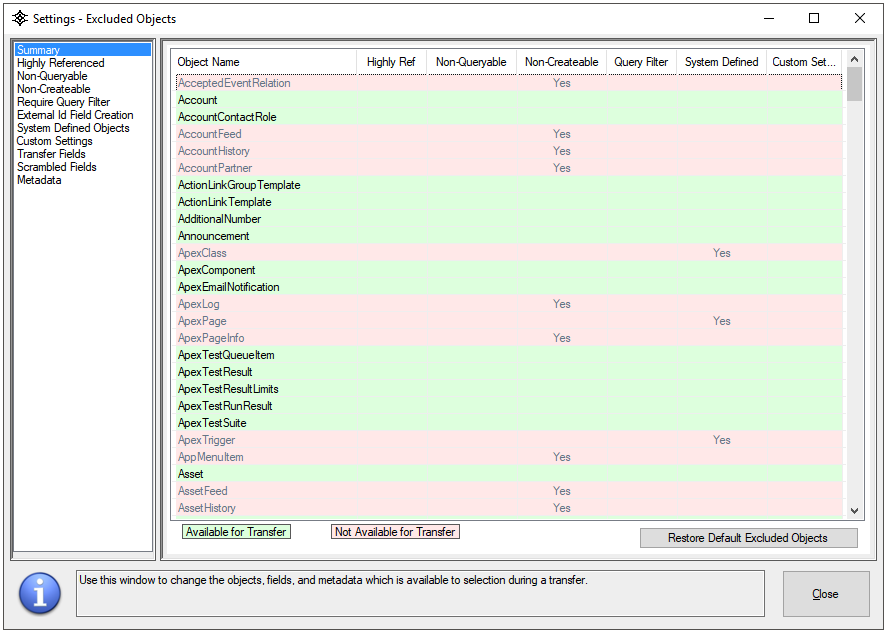Excluded Objects

Summary
This grid displays the objects which are available for transfer (highlighted in Green), those which are not (highlighted in Red). The columns identify the reason (if any) of why the object is excluded from Transfer.
Highly Reference Objects
This screen defines which highly referenced objects should be ignored (excluded for selection) by the application for transfer. Change the Reference Count Threshold field to change the Excluded for selection objects. To disable this functionality, uncheck the Exclude Highly Referenced Objects checkbox. The default threshold is automatically calculated when the project file is first created.
Non-Queryable
These objects cannot be queried by using the SOAP API.
Non-Creatable
These object records cannot be created and are ignored by the application. These are typically system records or objects which don't have the "Create" permission.
Require Query Filter
These objects cannot be queried using standard conventions and must contain a filter criterion (WHERE) clause to be accessed. For this reason, the application ignores these objects completely.
Use the Auto-Detect Query Filter Objects button to let the application automatically determine which objects require a query filter to be defined.
External ID Field Creation
These are object that are either not available as "Custom Objects" through the Metadata API, are part of the Ignored Objects sections below, or do not support creation of custom fields. Thus, these objects cannot utilize External Ids.
Checkmark the Excluded object if you want to use the Name field on the object as the "External Id". Please note that if the name field is not unique and multiple records exist with the same name, only the first record with the duplicate name will get updated and subsequent records will NOT get updated.
System Defined Objects
These are object which are copied over (including data) when the Sandbox is created and are ignored by the application.
By default, Salesforce will copy Custom Settings, and other Standard Objects which contain "Settings" data when the sandbox is created. Metadata related objects (i.e. ApexClass, ApexTrigger) are also copied by Salesforce when the sandbox is created.
Custom Settings
These are objects where are classified as Custom Settings. By default, Salesforce will copy Custom Settings when the sandbox is created.
Transfer Fields
These are fields which should be ignored by the application and not be transferred to the destination org. If an object contains many fields, use this screen to ignore some of those fields. You can either define field names applicable to all objects, of object-specific fields.
Scramble Fields
Use this window to specify fields you want to scramble data for. The application will read the data type of the field and randomly generate characters which conform to the field type.
Metadata
These are Objects, Workflows, and Trigger metadata files which the application should ignore.